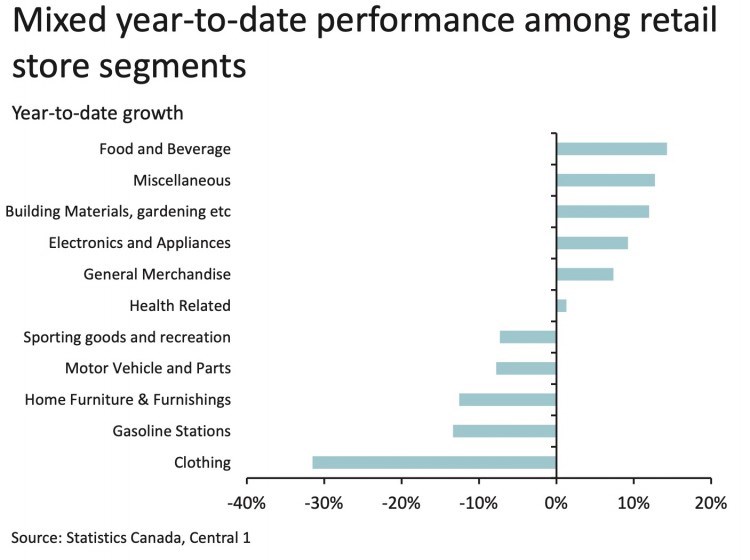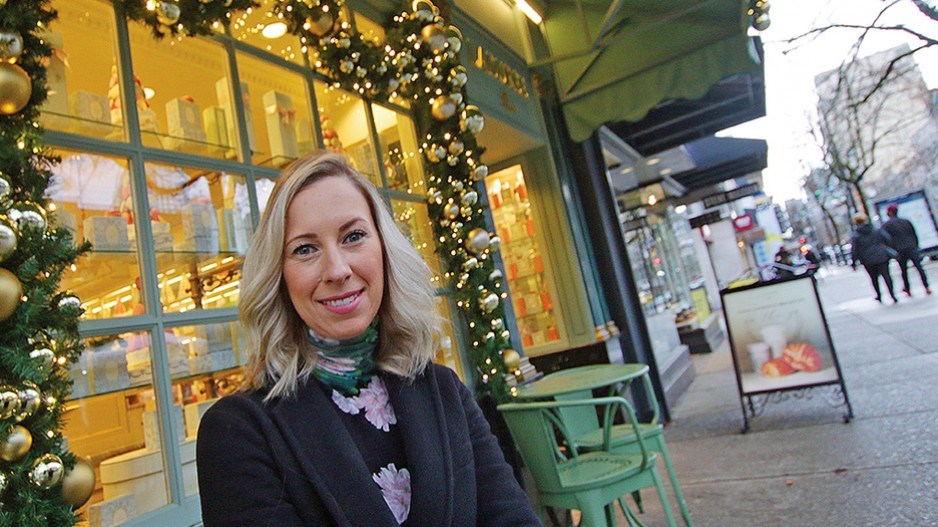COVID-19 is expected to disrupt holiday-season buying habits in the same way that it has transformed consumers’ purchase choices and how they have shopped since the pandemic emerged early in the year.
Broadly, the retail sectors that have best withstood the pandemic – including food and beverage, building materials and electronics – are expected to continue to do well as Christmas approaches, while there is no immediate relief in sight for those have suffered, such as those who sell clothing, home furnishings, motor vehicles and parts and sporting goods, according to Statistics Canada data.
Prime shopping districts, such as Robson Street, have suffered. Robson Street Business Improvement Association Executive Director Teri Smith said the loss of tourists and nearby office workers has dealt a fatal blow to some retailers.

(Above chart is based on sales in the first nine months of 2020, compared to the same time period a year ago | Statistics Canada, Central 1 Credit Union)
E-commerce retailers will continue to benefit as customers avoid physical stores to limit potential contact with the virus.
Statistics Canada released data in late October that showed Canadian e-commerce sales in August increased 60.6% compared with the same month a year ago.
That trend is likely to continue, given a recent Ipsos survey, commissioned by Google (Nasdaq:GOOGL), which found that 65% of Canadians who plan to shop this holiday season said they expect to do more shopping online than in previous years.
Other surveys found that Canadians planned to spend less overall on holiday shopping this year than last year.
Having had more than eight months to reflect on how to protect customers and to create and adhere to mandated COVID-19 safety plans, most retailers believe they are ready for both in-store and online sales this holiday season.
B.C. never ordered non-essential retail businesses to close, but required them to have safety plans.
For many that meant spending time in the spring creating new e-commerce websites, using platforms such as Shopify (TSX:SHOP) or Big Commerce (Nasdaq:BIGC) as well as investing in Plexiglas for check-out counters.
Kali Boutique owner Sonia Kalathil, for example, set up an e-commerce website via Shopify for her clothing, homeware and accessories business that has stores in Victoria, and on Commercial Drive in Vancouver.

(Image: Kali Boutique owner Sonia Kalathil stands inside her store on Commercial Drive | Chung Chow)
While e-commerce represents only about 5% of her sales, Kalathil expects that to increase as people shop for Christmas gifts. She foresees that a lot of the online holiday sales will be earlier this year, so customers can be sure that they will receive products with plenty of time to spare.
“We are expecting people to try to avoid shopping in December,” she said. “Sales will be spread out more, and people will be purchasing gift cards for online shopping.”
Black Friday overlaps with Kali Boutique’s 27th anniversary, and Kalathil said she will have promotions to spur sales.
She carries many locally made products, and she told BIV that she has heard customers tell her how much they like buying local.
Other B.C. companies, such as Victoria-based clothing retailer Ecologyst, have similarly been shifting sales online. Its surging e-commerce sales have helped overall sales be up year-over-year in October, according to CEO Rene Gauthier.
Retail Insider Media owner and retail analyst Craig Patterson said much of Kalathil’s experience is felt by retailers across the country. “Some retailers are looking at doing a lot of discounting or trying to spread sales out,” he said. “Many started in October, around the Canadian Thanksgiving, and the rationale for that is not to create massive crowds and have people be in stores all at one time.”
To stimulate early sales, retailers have been assuring customers that prices will not fall further toward year’s end, he said.
“Retailers are being very cognizant of even just the optics around drawing huge crowds into a space, especially as we have been seeing record-breaking numbers of cases in Ontario, B.C. and other places.”
While Patterson praised entrepreneurs such as Kalathil for taking the plunge and building e-commerce websites, he said many small businesses owners have yet to do that.
For retail entrepreneurs who are reluctant to create e-commerce websites on their own, Patterson suggested that they reach out to Ontario-based Digital Main Street, which has some free resources and assists businesses with the process. •




